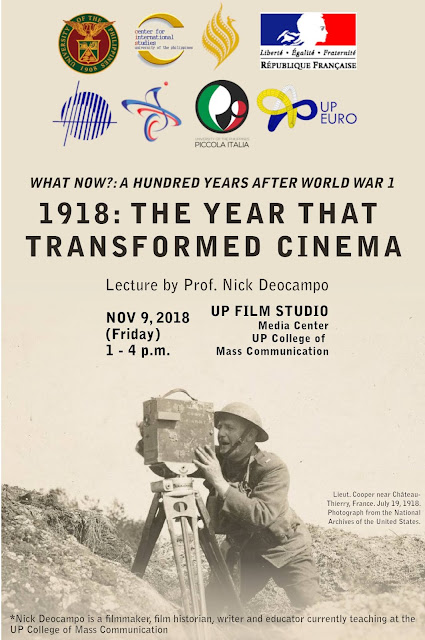What Now? A Hundred Years after World War I
The end of a world war started the beginning of a new world
In commemoration of the centennial
of the First World War, a forum was conducted last November 9, 2018 in UP Film
Institute where Professor Nick Deocampo, a film historian, gave a lecture
entitled “1918: The Year That Changed The World Film Order”. As an armistice was signed in November 1918
that signaled the end of the WWI, it also signaled a beginning of a new world
cinema. The war did not spare much of the European industry, hence Europe has
experienced a total devastation of film infrastructure that resulted to an end
to their film dominance; whereas the United States of America started its
overseas conquest to set up Hollywood,
their movie industry, to the world. 1918 also gave birth to the notion of
national cinema to Asia particularly that of the Philippines. What followed
were history!
Through motion pictures, ideologies
can further be instilled to people and USA took the opportunity to utilize film
in their vantage of world domination as Hollywood is apparently what dominates
our world cinema up until today. In the
context of the Philippines and its cinema, Hollywood has successfully
perpetuated its presence through the film standards and its socio-cultural and
political impact. A good film is and should be like Hollywood and that is why
the popular cinema in the Philippines has tried its best to imitate such but
apparently has a distant way to go before achieving anything at all. Despite
the slow progress, the American ideologies have long been established – from
commercialism, societal standards of beauty to pop culture and language. The
ideological power that the America holds upon us has affected our national
identity immensely which can be attributed to their occupation after the
Spanish rule. Indeed, a hundred years can provide a plethora of changes and
progress in both micro and macro perspective. For instance, it gave birth to
the Philippine cinema and consequently, the Philippines serves a vital role in
the establishment of film during the crucial times of colonial Asia as it is
one of the first countries where western cinema arrived and made its influence.
Essentially, the end of a world war started the
beginning of a new world and it is proven by the shift of ideological power
from Europe to America. Just like in the ancient times where Western Philosophy
originated in Europe which held the power of knowledge, the world was later
conquered by the West or the America with regards to their knowledge of
technology and industry, supremacy to innovation and armed forces, and hegemony
to culture over several countries around the world. However, such is not
absolutely the case as the East has also its respective merits to their own socio-cultural
and political progress. Nonetheless, a hundred years after World War I resulted
to what the world had become today: a
second world war, backwards ideologies of fascism, macho-feudal societies,
countries still developing and many more underdeveloped ones, territorial
disputes, unstable governments in some states around the world, etc. Despite
regarding the negatives of the after effect the First World War, the world has
positively developed people in societies. With positive I meant -
progressive people standing for real change, tolerance and acceptance, preservation of culture and tradition, advancing societies while sustaining environments, and genuine education for students who are the posterity of this world.Lecture- Reaction paper
SOC SCIE 2 (Social, Economic, and Political Thought)
25 November 2018
 |
| © UP Film Institute Official FB page |










Comments
Post a Comment